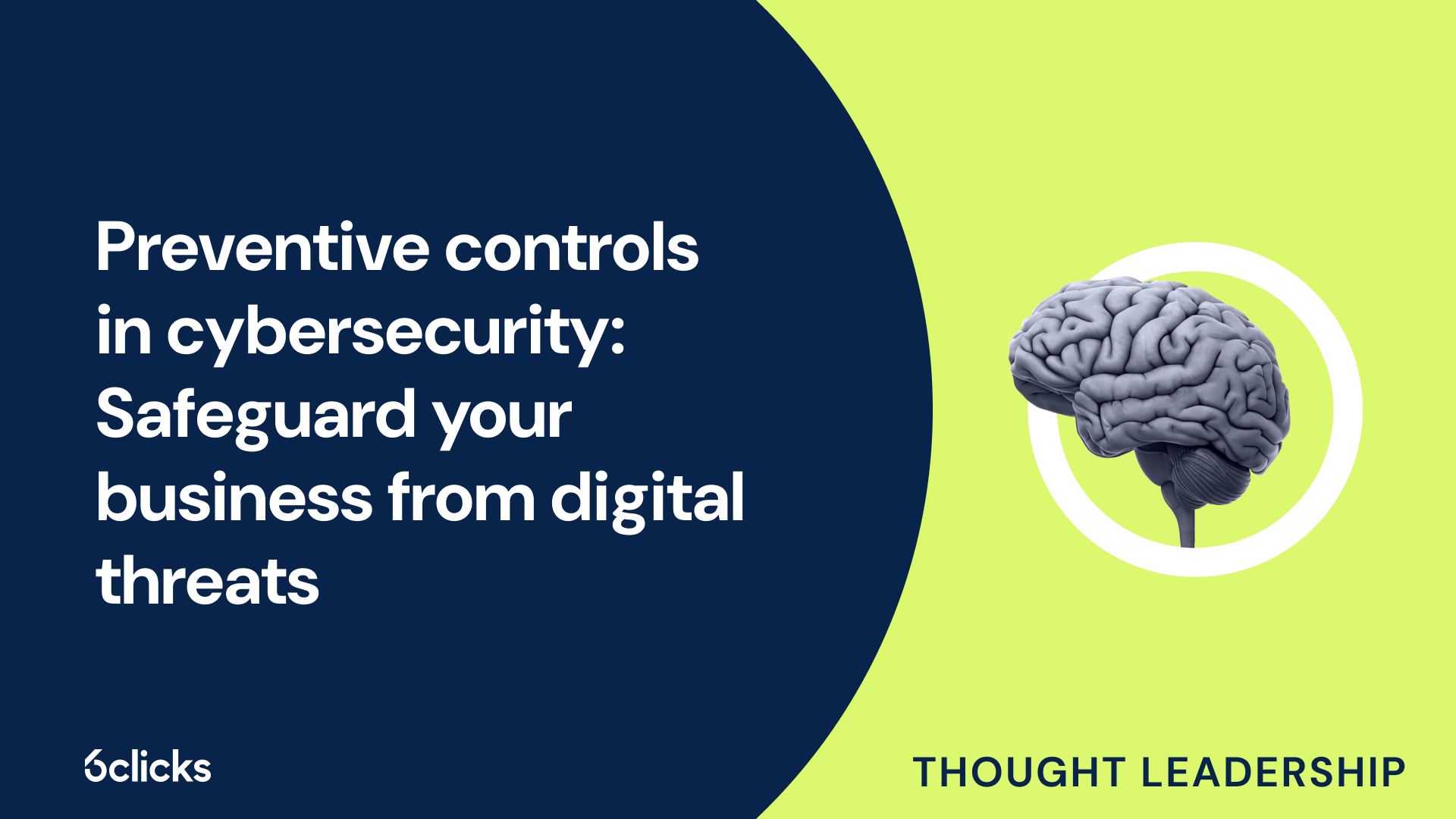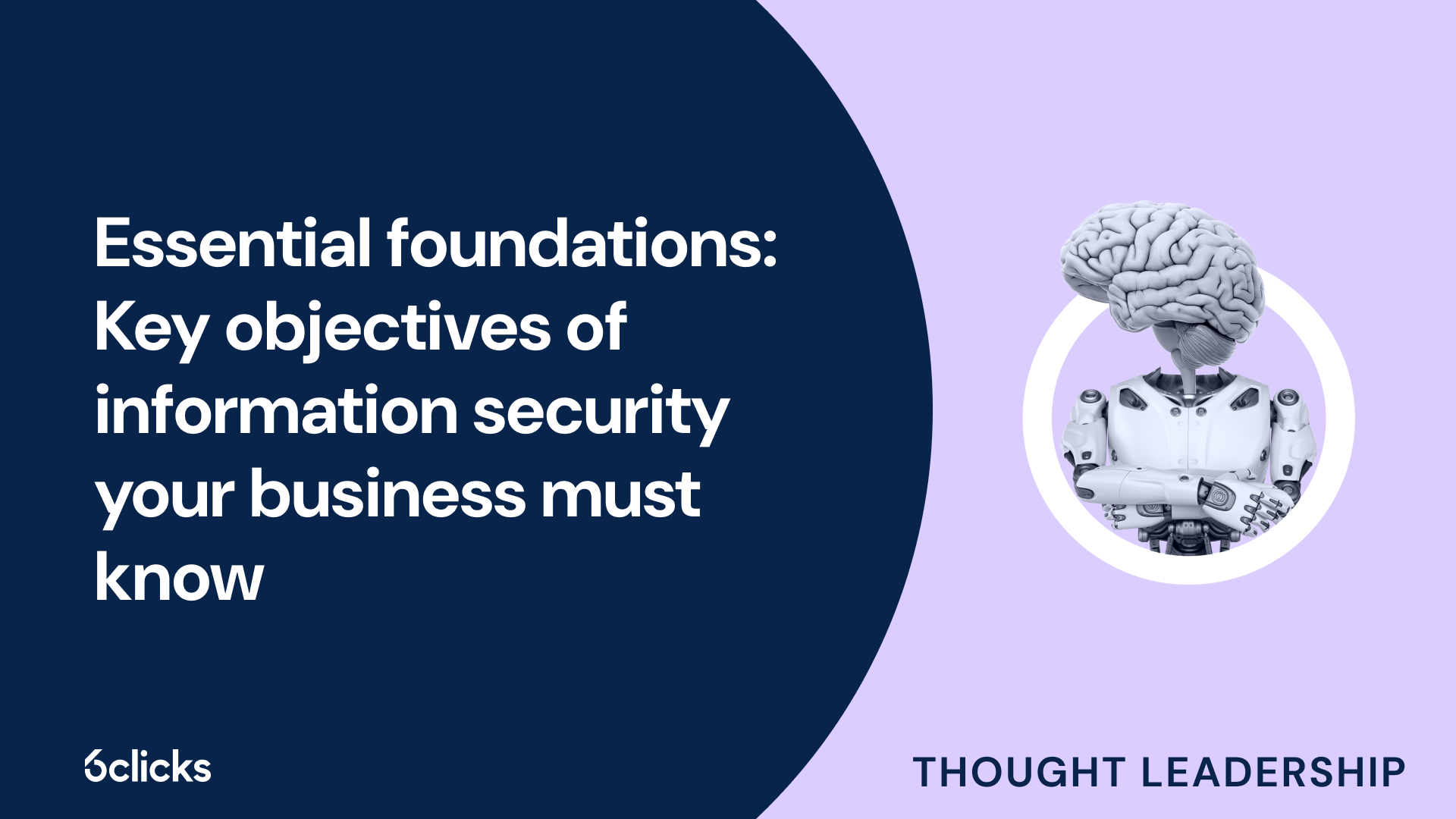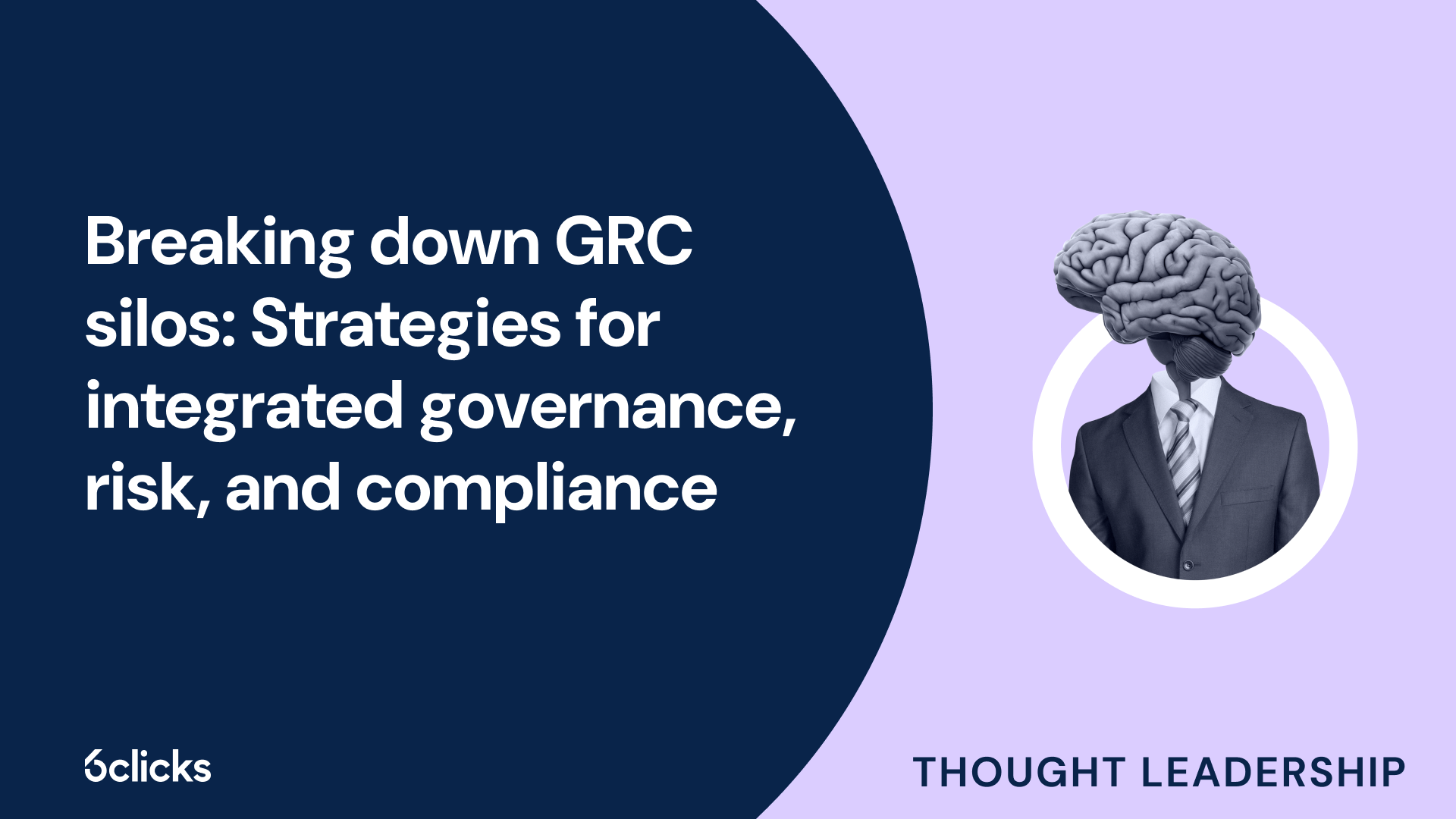The GRC buyer’s guide for 2025: Building resilience with AI-powered, federated solutions
Discover the ultimate GRC buyer's guide for 2025! Uncover how AI-powered, federated solutions transform compliance and security management for industries like government, aerospace, banking, and more. Learn about centralized control, continuous compliance, and advanced cyber GRC capabilities. Download now!
-1.png?width=200&height=249&name=Group%20193%20(1)-1.png)
The GRC buyer’s guide for 2025: Building resilience with AI-powered, federated solutions
Definition of cybersecurity compliance
Cybersecurity compliance refers to the adherence to regulatory requirements and industry standards aimed at protecting organizations and individuals from cyber threats. It involves understanding and implementing necessary security controls and measures, as well as establishing incident response plans and risk assessment processes. Several regulatory authorities and federal agencies have been tasked with overseeing and enforcing cybersecurity compliance across various sectors. These agencies ensure that organizations, particularly those in the financial services industry, comply with cybersecurity standards and regulations such as privacy laws and protection laws. Additionally, international standards and frameworks, such as the cybersecurity framework developed by the National Institute of Standards and Technology (NIST), provide guidance for organizations to establish effective cybersecurity programs and compliance measures. By maintaining cybersecurity compliance, organizations can mitigate potential threats and unauthorized access to their systems, protecting their essential services and customer data from cyber incidents.
Overview of regulatory authorities
Overview of Regulatory Authorities for Cybersecurity Compliance
Cybersecurity compliance is a vital aspect of protecting against cyber threats and ensuring the security of data and information. A range of regulatory authorities at the federal level is responsible for enforcing cybersecurity compliance standards and requirements.
One of the key agencies is the Department of Homeland Security (DHS), which oversees the cybersecurity posture of essential services and designated critical infrastructure sectors. The DHS actively collaborates with other regulatory authorities and private sector entities to combat cyber risks and enhance resilience.
The Department of Defense (DoD) plays a crucial role in cybersecurity compliance, particularly for national defense and military systems. It employs robust security controls to protect sensitive information against unauthorized access and cyber incidents.
The National Institute of Standards and Technology (NIST) develops and promotes cybersecurity standards, guidelines, and best practices. Its cybersecurity framework serves as a comprehensive guide for organizations to assess and improve their cybersecurity practices.
The Federal Trade Commission (FTC) focuses on protecting consumer privacy and enforcing cybersecurity requirements for a range of entities, including both public companies and non-regulatory agencies. It holds companies accountable for implementing adequate security measures and responding effectively to data breaches.
Other federal agencies with cybersecurity compliance responsibilities include the Internal Revenue Service (IRS), Office of the Comptroller of the Currency (OCC), and Consumer Financial Protection Bureau (CFPB). These agencies oversee compliance regulations specific to financial institutions, safeguarding sensitive financial and personal information.
Federal agencies regulating cybersecurity compliance
Cybersecurity compliance is a critical component in safeguarding against cyber threats and ensuring the security of data and information. Various federal agencies are responsible for enforcing cybersecurity compliance standards and requirements. These agencies work diligently to protect essential services, critical infrastructure sectors, consumer privacy, and sensitive financial and personal information. By implementing robust security controls, promoting best practices, and holding entities accountable for their cybersecurity practices, these agencies play a vital role in enhancing cybersecurity resilience and mitigating potential threats. Let's explore the key federal agencies that regulate cybersecurity compliance in more detail.
Department of homeland security
The Department of Homeland Security (DHS) plays a crucial role in regulating cybersecurity compliance in the United States. As the primary federal agency responsible for ensuring the country's security and protecting its essential services, the DHS has broad authority in cybersecurity matters.
One of the key responsibilities of the DHS is to strengthen cybersecurity resilience by implementing strategic initiatives and policies. This involves working closely with various sectors, including private companies, financial institutions, and government agencies, to develop effective cybersecurity programs. The DHS also conducts risk assessments and helps organizations improve their security practices by providing guidance on cybersecurity measures and controls.
In recent years, the DHS has issued several important directives to address pressing cybersecurity issues. For example, they released a security directive on enhancing pipeline security in response to the cyber attack on the Colonial Pipeline, emphasizing the need for critical infrastructure operators to assess and mitigate cyber risks. Additionally, the DHS has called for action in tackling ransomware threats, acknowledging the growing menace of these cyber incidents and emphasizing the importance of incident response plans and compliance with cybersecurity standards.
Department of defense
The Department of Defense (DoD) plays a crucial role in regulating cybersecurity compliance within its networks and systems. It recognizes the need to protect sensitive information and maintain the integrity of its operations. The DoD has implemented various initiatives and requirements to ensure proper cybersecurity practices and protect controlled unclassified information (CUI) on partner systems.
One significant development in recent years is the introduction of the Cybersecurity Maturity Model Certification (CMMC). The CMMC is a unified standard for cybersecurity across the defense industrial base (DIB) and is mandatory for DoD contractors. It aims to ensure that contractors have appropriate cybersecurity practices in place to safeguard CUI. The CMMC framework includes five levels of maturity, ranging from basic cyber hygiene practices to advanced and proactive measures. Contractors must achieve the specific level required for their contracts.
To enforce cybersecurity compliance and protect CUI, the DoD has implemented certain actions. These include conducting audits and assessments of contractors' cybersecurity practices to ensure they meet the necessary requirements. The DoD also collaborates with industry partners to share information on best practices and emerging cyber threats. Additionally, contractors must implement and maintain specific security controls and protocols to protect against unauthorized access and cyber attacks.
With the DoD's strict focus on cybersecurity compliance and the introduction of the CMMC, contractors working with the DoD are expected to prioritize cybersecurity measures and demonstrate their commitment to protecting sensitive information. This regulatory framework strengthens the overall cybersecurity posture of the defense industry and helps mitigate potential cyber threats.
National institute of standards and technology (NIST)
The National Institute of Standards and Technology (NIST) is a federal agency that plays a crucial role in regulating cybersecurity compliance. As a leading authority in the field, NIST is responsible for setting cybersecurity standards and providing guidelines for risk management and incident response plans.
NIST works closely with industry experts, academia, and government agencies to develop and maintain cybersecurity standards that help organizations protect their systems and data from cyber threats. These standards are regularly updated to address emerging threats and evolving technologies.
In addition to setting standards, NIST provides comprehensive guidelines for risk management and incident response plans. These guidelines assist organizations in identifying and assessing cyber risks, developing strategies to mitigate those risks, and establishing effective incident response plans to minimize the impact of cyber incidents.
NIST's cybersecurity standards and guidelines are widely adopted by both public and private sector organizations. They serve as the foundation for cybersecurity programs and compliance requirements across various industries. By following NIST's guidance, organizations can implement effective security practices, protect sensitive information, and enhance their overall cybersecurity posture.
Federal trade commission (FTC)
The Federal Trade Commission (FTC) plays a crucial role in regulating cybersecurity compliance in the United States. Under the authority granted by the FTC Act, the agency is responsible for protecting consumers from unfair and deceptive trade practices, which extends to cybersecurity.
The FTC Act empowers the FTC to take action against companies that fail to adequately safeguard consumer data or engage in unfair business practices related to cybersecurity. The act prohibits companies from engaging in deceptive practices or misrepresenting the security measures they have in place to protect consumer data.
In cases where companies are found to be non-compliant with cybersecurity standards, the FTC can take various enforcement actions. These actions can include issuing civil penalties, requiring companies to implement cybersecurity programs, enforcing requirements for third-party service providers, and conducting regular compliance audits. The FTC can also initiate legal proceedings against companies that fail to comply with its orders.
The FTC's enforcement authority and actions against non-compliant companies serve to hold organizations accountable for maintaining robust cybersecurity practices and protecting the personal information of consumers. By actively regulating cybersecurity compliance, the FTC helps ensure that individuals and businesses can trust the security of their interactions in the digital realm.
Internal revenue service (IRS)
The Internal Revenue Service (IRS) plays a crucial role in regulating cybersecurity compliance, particularly for businesses, including those in the financial services sector. While primarily responsible for tax collection and enforcement, the IRS also imposes specific regulations and requirements to ensure the protection of sensitive customer and financial data.
Under the IRS's cybersecurity compliance framework, businesses are obligated to implement a range of measures to safeguard customer data and prevent cyber threats. These include adopting robust security controls, conducting regular risk assessments, creating incident response plans, and establishing internal controls to mitigate cyber risks. Additionally, organizations are required to comply with privacy standards and laws that protect sensitive customer information.
To maintain compliance, businesses must adhere to IRS regulations regarding the protection of financial data. Financial institutions are required to implement strong network firewalls, encryption protocols, and access controls to prevent unauthorized access to customer data. They are also expected to establish comprehensive cybersecurity programs that assess and manage cyber risks in line with the IRS's risk analysis process.
By enforcing these regulations and requirements, the IRS safeguards the integrity of financial systems and protects sensitive customer data from cyber threats. Compliance with IRS cybersecurity measures is essential for businesses, especially those in the financial services industry, to safeguard their operations and ensure customer trust and confidence.
Office of the comptroller of the currency (OCC)
The Office of the Comptroller of the Currency (OCC) is a regulatory authority that plays a crucial role in overseeing cybersecurity compliance in financial institutions. As part of its responsibilities, the OCC ensures that financial institutions establish and maintain effective cybersecurity programs to protect customer data from cyber threats.
The OCC provides specific requirements and guidelines for financial institutions to follow in order to maintain robust cybersecurity controls. These guidelines encompass various aspects of cybersecurity, such as risk assessments, incident response plans, and security practices. Financial institutions are expected to conduct regular risk assessments to identify potential threats and vulnerabilities, and to establish appropriate measures to mitigate those risks.
Furthermore, the OCC emphasizes the need for financial institutions to implement security controls that adhere to industry standards and best practices. This includes maintaining up-to-date software, utilizing strong authentication methods, and establishing appropriate access controls for sensitive data.
Consumer financial protection bureau (CFPB)
The Consumer Financial Protection Bureau (CFPB) plays a crucial role in regulating cybersecurity compliance within the financial services industry. As the primary federal agency responsible for consumer protection, the CFPB sets and enforces rules and regulations to ensure the security of consumer data and privacy.
The CFPB's approach to enforcing cybersecurity compliance involves several key actions and measures. Firstly, the bureau establishes and enforces cybersecurity standards and requirements that financial institutions must adhere to. These standards may include implementing robust security controls, conducting thorough risk assessments, and developing incident response plans.
To ensure compliance, the CFPB conducts regular examinations and assessments of financial institutions. During these examinations, the agency evaluates the effectiveness of the institution's cybersecurity program, the adequacy of risk management practices, and the implementation of necessary security measures.
In addition to examinations, the CFPB actively investigates cybersecurity incidents and breaches within the financial services industry. The bureau has the authority to take enforcement actions against institutions found to be in violation of cybersecurity standards or engaged in unfair, deceptive, or abusive practices.
Moreover, the CFPB works to promote consumer data protection and privacy in relation to cybersecurity. The bureau develops and implements policies and procedures that safeguard consumer information from unauthorized access and disclosure. This includes enforcing compliance with relevant privacy laws and regulations, as well as collaborating with other regulatory authorities to establish comprehensive data protection frameworks.
State regulations on cybersecurity compliance
State regulations on cybersecurity compliance vary across different jurisdictions. Many states have established their own regulatory requirements and enforcement mechanisms to ensure the protection of sensitive data and the resilience of critical infrastructure. These regulations are designed to address the unique needs and challenges of each state's cybersecurity landscape and may encompass a range of industries, including financial services, healthcare, and energy. State regulations often require organizations to implement various cybersecurity measures, such as risk assessments, incident response plans, and security controls. Additionally, state regulatory authorities may conduct audits and examinations to assess compliance with these requirements and enforce penalties for non-compliance. It is important for businesses operating in multiple states to be aware of and adhere to the specific cybersecurity compliance requirements of each state in order to effectively protect their data and meet regulatory obligations.
California privacy rights act (CPRA)
The California Privacy Rights Act (CPRA) is a state law that aims to strengthen consumer privacy rights and impose stricter obligations on businesses in California handling personal information. It builds upon the existing California Consumer Privacy Act (CCPA) and further enhances privacy and cybersecurity compliance requirements.
The CPRA expands the definition of sensitive personal information, including categories such as social security numbers, driver's license information, and account credentials. This broader definition increases the scope of personal information that businesses must safeguard.
One significant aspect of the CPRA is the establishment of the California Privacy Protection Agency, a new enforcement authority responsible for implementing and enforcing the CPRA's provisions. This agency will have the power to regulate, investigate, and impose penalties on businesses that fail to comply with the CPRA's requirements.
Additionally, the CPRA grants consumers enhanced rights regarding their personal information, allowing them to limit the use of sensitive data, correct inaccurate information, and opt-out of targeted advertising.
Colorado security breach notification law
The Colorado security breach notification law is a legislation that aims to protect individuals in the state from the potential harm caused by security breaches that compromise their personal information. Under this law, organizations are required to notify affected individuals in the event of a breach.
The notification requirements under the Colorado security breach notification law include specific timelines for issuing the notification. Organizations must notify affected individuals within 30 days from the discovery of the breach, unless a law enforcement agency determines that the notification will impede a criminal investigation.
The notification must include certain information, such as a description of the incident, the types of personal information that were compromised, the timeframe of the breach, and contact information for the organization responsible for the breach. In some cases, organizations may also be required to provide information about the steps that affected individuals can take to protect themselves from potential harm.
There are exemptions to the notification requirement in certain circumstances. For example, if an organization determines that the breach is unlikely to result in harm to affected individuals, notification may not be required.
Non-compliance with the Colorado security breach notification law can result in penalties. These penalties can vary depending on the severity of the violation and may include fines or other legal remedies. It is important for organizations to ensure they are familiar with the requirements of the law and take the necessary steps to comply in order to protect the privacy and security of individuals' personal information.
Nevada data breach notification law
The Nevada data breach notification law is a state regulation that falls under cybersecurity compliance. It outlines the requirements for organizations to notify individuals in the event of a data breach.
Under this law, organizations must notify affected individuals of a breach promptly, without unreasonable delay. Notification must be made in writing or through electronic means, and it should include specific information such as the date and estimated timeframe of the breach, the types of personal information that were compromised, and contact information for the organization responsible for the breach.
Additionally, if the breach involves the personal information of 1,000 or more Nevada residents, organizations are required to notify the Office of the Attorney General. If multiple residents are affected, the notification to the Attorney General must include details regarding the total number of affected individuals and the measures taken to provide the necessary notifications.
The law defines personal information as an individual's first name or initial, coupled with either their last name plus one or more specific data elements such as social security number, driver's license number, or financial account number.
Non-compliance with the Nevada data breach notification law can result in penalties, including fines and potential liability for damages suffered by affected individuals. Therefore, organizations are encouraged to be vigilant and ensure they have adequate cybersecurity measures in place to prevent and address data breaches, in adherence to this state regulation.
International regulations on cybersecurity compliance
International regulations on cybersecurity compliance exist to protect information technology systems and data from cyberattacks. These regulations ensure that organizations implement security measures to prevent unauthorized access and protect sensitive information from potential threats.
One important international regulation is the California Privacy Rights Act (CPRA). This law enhances privacy rights and expands cybersecurity compliance requirements for businesses operating in California. It introduces new obligations, such as conducting regular cybersecurity audits, implementing security controls, and providing consumers with the right to limit the use of their personal data.
Another key regulation is the Colorado Security Breach Notification Law. It mandates that organizations notify residents of Colorado if their personal information has been compromised in a data breach. The law sets specific requirements for notification, including the timeframe for reporting the breach and the information that must be included in the notification.
The Nevada Data Breach Notification Law is another significant regulation. It requires organizations to promptly notify affected individuals in the event of a data breach. The law specifies the information that should be included in the notification, such as the date and type of breach, and requires notification to the Office of the Attorney General if a certain number of Nevada residents are affected.
Compliance with these international regulations is essential to protect individuals' privacy and ensure the security of sensitive data. Organizations must stay abreast of these regulations and implement robust cybersecurity measures to maintain compliance.








